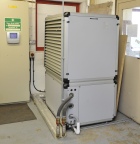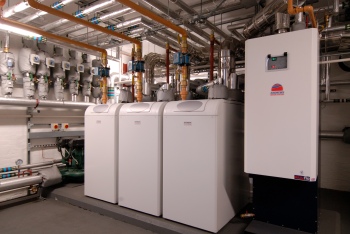Anticipating ErP benefits

Like-for-like replacement of equipment in heating and hot-water system will often not be possible when the ErP Directive comes into effect. But why wait when the benefits are so positive, asks Andy Green of Baxi Commercial.
If maximum efficiency is to be obtained from a building-services heating and hot-water system, regular maintenance will be essential, but over time system components will need replacing. Although selecting improved products using technological advances introduced since the system was first installed may be considered, in many instances refurbishment can often mean simply installing more of the same. At the moment, this freedom of choice still applies, but this is likely to change when the EU Directive concerning ErP (Energy related Products) is implemented in September 2015.
ErP is concerned with the eco-design of energy-related products, to reduce their environmental impact without entailing excessive costs. As heating and hot water accounts for some 50% of the energy demand and, therefore, greenhouse-gas emissions of a commercial building, boilers, water heaters and hot-water storage tanks have been high on the ErP hit list. When implemented, this will cover all energy-related products which are ‘placed on the market’ or ‘put into service’ — meaning that both new-build and refurbishment projects will be affected.
One reaction of facilities managers might be to hope that the refurbishment of heating and hot-water systems can be postponed for as long as possible, but this would be to overlook the principal purpose of the ErP measures. Equipment compliant with the new eco-design standards is estimated to achieve a performance improvement of some 20% in new-build applications, leading to a considerable reduction in energy costs. The installation of ErP-approved equipment in a refurbishment project will also result in reduced energy bills, which should make considering their introduction a matter of accelerated action rather than hoped for delay.
Not surprisingly, the heating industry is aware of the implications for its customers, and leading manufacturers are already providing the market with products that suit their customers’ needs whilst meeting known ErP requirements. This means that commercial building operators can, at an early opportunity, consider a prefabrication project to maximise energy and cost savings, knowing that the equipment installed will not fall foul of ErP requirements if repair or replacement is needed after 2015.
Many existing heating and hot-water systems include a non-condensing boiler component, and present regulations allow the option of refurbishment with a like-for-like replacement. Following the implementation of ErP in 2015, this will not be possible in the case of a non-condensing boiler with an output below 400 kW. Replacement with a condensing boiler in such cases will be mandatory, but ErP compliance may not be the only consideration.
For example, the refurbishment project may be to replace an existing floor-standing non-condensing boiler with a new condensing boiler of similar form and capacity. However, the condensing boiler may have larger dimensions, which would prevent simple replacement in a plant room with restricted access. The difficulty would be overcome by selecting a modular wall-hung boiler, or a number installed in cascade, adding greater manoeuvrability and positioning flexibility to ease of installation.

Clearly, businesses are unlikely to find considering the refurbishment of an existing heating and hot-water system a simple task. Decisions regarding the integration of a renewable fuel source and compliance with statutory requirements concerning heating component and system energy efficiency will require a detailed understanding of all the energy and performance parameters involved. These matters will need to be considered and resolved as soon as possible, preferably at the design stage, and forward-looking manufacturers are making this information available in digital format using BIM (Building Information Modelling) technology.
Being able to incorporate a manufacturer’s BIM-compatible data model of an energy-using product into a project’s BIM software application gives the system designer the ability to apply as many tests or trials as needed in a virtual environment. This saves the time, energy and money that would otherwise be wasted by trial-and-error testing on site at the installation stage. Using BIM technology to analyse the application of all characteristics and efficiencies, including energy and performance factors, as part of the product and system selection process during a refurbishment project is likely to play an increasingly important role into the future.
The implementation of ErP requirements may not be imminent, but leading manufacturers are already making it possible for commercial undertakings to initiate replacement and refurbishment of existing heating and hot-water systems with ErP-compliant equipment. This enables advantage to be taken of the opportunities currently available to counter ever-increasing energy bills — such as installing condensing-technology products and integrating renewable energy sources without compromising compliance with known long-term mandatory building-performance provisions. Importantly, it may be possible to base decisions on the outcome of stringent testing on a virtual platform if BIM technology can be applied — effectively removing guesswork and avoiding the costly unforeseen incompatibilities that are not unknown to occur during installation.
Andy Green is technical manager with Baxi Commercial.








